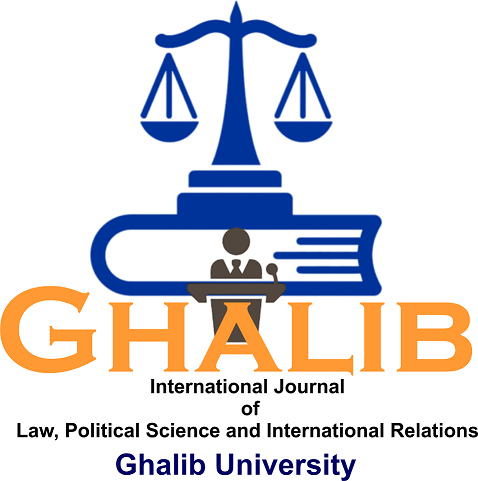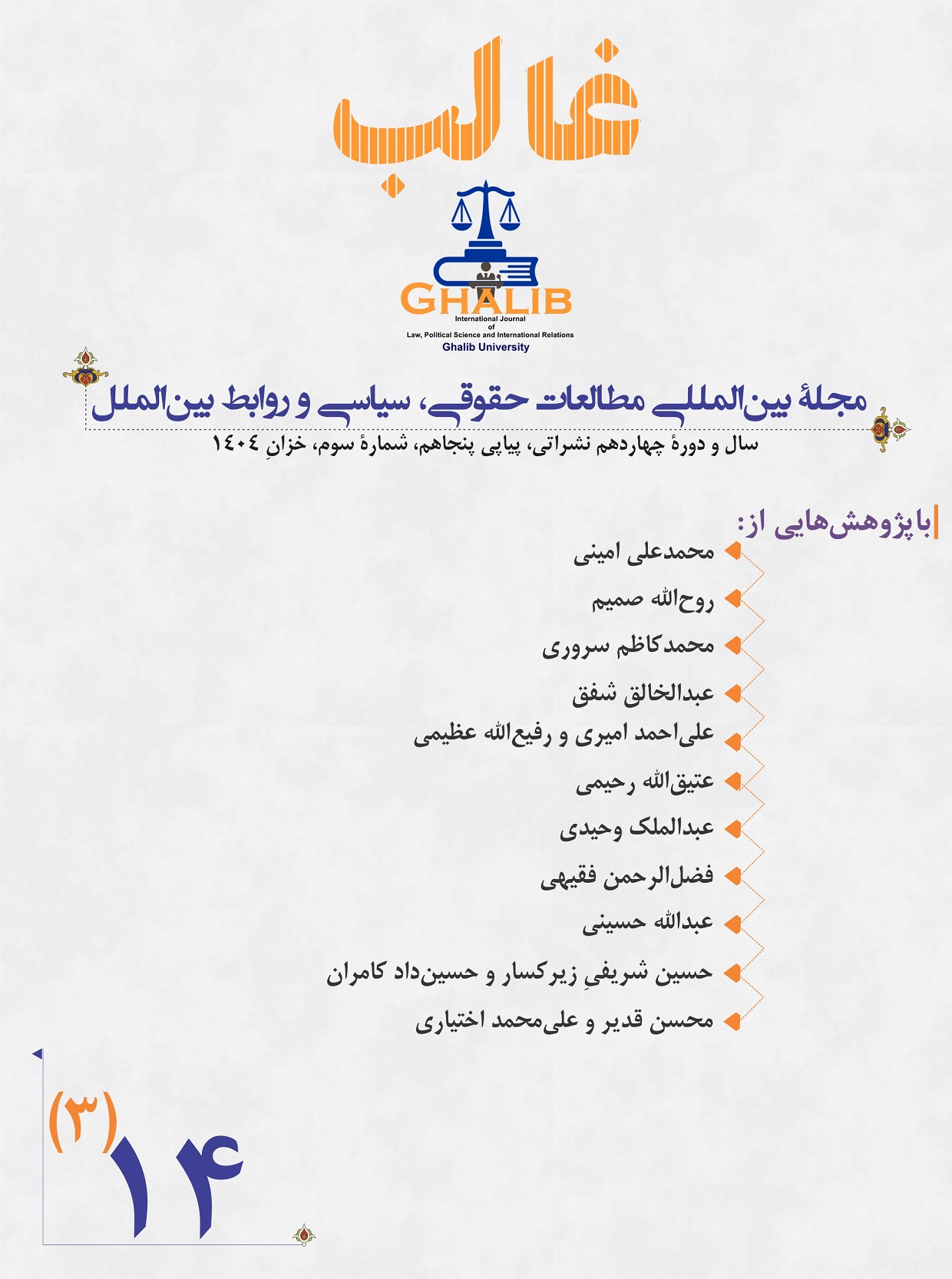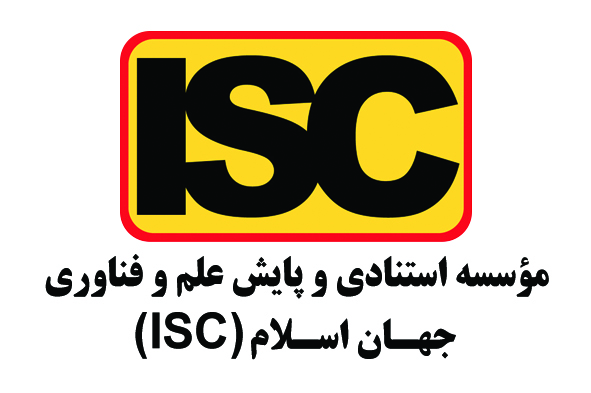دلایل جرمشناختی ضرورت احیای عدالت غیررسمی در افغانستان
DOI:
https://doi.org/10.58342/ghalibqj.V.14.I.3.7واژهگانِ کلیدی:
افغانستان، عدالت غیر رسمی، دعاوی حقوقی، قضایای جنایی، میانجیگری، منازعات اجتماعیچکیده
عُرف نقش مهمی در تعاملات اجتماعی افغانستان دارد و بسیاری از مسائل در مناطق مختلف این سرزمین بر پایۀ قواعد عُرفی حل میشوند. اهمیت این تحقیق از آنجا ناشی میشود که دعاوی زیادی از طریق جرگه، مارکه، اوره و شورا فیصله میشوند و جلوههایی از عدالت غیررسمی در کشور را نشان میدهند؛ بنابراین، شناخت توجیه فیصلههای عُرفی در کنار نظام عدلی و قضایی رسمی و بررسی دلایل جرمشناختی احیای عدالت غیررسمی اهمیت دارد. هدف پژوهش بررسی ضرورت و کارکرد عدالت غیررسمی در افغانستان و تحلیل فیصلههای اصلاحی براساس شرایط اجتماعی و حقوقی بوده است. پرسش اصلی تحقیق این است که: باوجود نظام عدلی رسمی، فیصلههای عُرفی چهگونه توجیه میشوند و احیای عدالت غیررسمی چه ضرورتی دارد؟ این مطالعه به روش توصیفی– تحلیلی انجام شد. ابزار گردآوری دادهها شامل تحلیل اسناد ملی و بینالمللی، بررسی میدانی فیصلههای جرگه، مارکه و شورا و منابع کتابخانهیی بود. محدودۀ تحقیق شامل مناطق مختلف افغانستان با تمرکز بر دعاوی اجتماعی و جنایی بود. یافتهها نشان داد که باتوجه به شرایط اجتماعی، احیای عدالت غیررسمی ضروری است؛ زیرا فیصلههای اصلاحی علاوه بر حل ریشهیی منازعات اجتماعی، موجب کاهش تورم جزایی، کاهش نفرتهای اجتماعی و کاهش هزینههای رسیدهگی میشوند. این نتایج همسو با خواستهای اسناد ملّی و بینالمللی است و بر اهمیت توجه به عدالت غیررسمی در نظام حقوقی افغانستان تأکید دارد.
سرچشمهها/ منابع
Ardeshir Amir-Arjomand. (2002). Regional Documents on Human Rights. Tehran: Shahid Beheshti University. [In Persian]
Mohammad Bastenegar. (2001). Human Rights from the Perspective of Thinkers. Tehran: Sherkat-e Sahami Enteshar. [In Persian]
Abdolali Tavajohi. (2004). The Idea of Victim Protection and Its Place in the Global Context and Iran’s Legislative Criminal Policy, in Criminal Sciences (Collection of Articles in Honor of Professor Dr. Ashuri). Tehran: SAMT Publications. [In Persian]
Alireza Jamshidi. (2008). Participatory Approach in Iran's Criminal Policy (Doctoral Dissertation in Criminal Law and Criminology). Tehran: Shahid Beheshti University, Faculty of Law. [In Persian]
José Luis de la Cuesta. (2004). European Criminal Policy (Translated by Ali-Hossein Najafi Abrandabadi), in Criminal Sciences (Collection of Articles in Honor of Professor Dr. Mohammad Ashuri) (3rd ed.). Tehran: SAMT Publications. [In Persian]
Mehrdad Rayejian Asli. (2013). Victimology (2nd ed.). Tehran: Shahr-e Danesh Publications. [In Persian]
Mehrdad Rayejian Asli. (2013). Victimization of Victims of Abuse of Power in the Light of the Comparison of the Two Principles of Individual and Group Victimization, in New Developments in Criminal Sciences (Collection of Articles) under the supervision of Ali-Hossein Najafi Abrandabadi (2nd ed.). Tehran: Mizan Foundation. [In Persian]
Khadem Hossein Rahimi. (2011). Manifestations of Public Participation in the Resolution of Criminal Disputes in Afghanistan (Master’s Thesis in Criminal Law and Criminology). Tehran: Ahlul-Bayt University, Faculty of Law. [In Persian]
Mohammad Ashraf Rasuli. (2017). General Criminal Law of Afghanistan. Kabul: Wazheh Publications. [In Persian]
Howard Zehr. (2004). Restorative Justice (Translated by Hossein Gholami). Tehran: Majd Publications. [In Persian]
Mohammad Sadr Tohidkhaneh. (2009). General Criminal Law of Afghanistan (3rd ed.). Kabul: Max Planck Institute. [In Persian]
Ali Safari. (2004). “Victim Support and Civil Society Institutions.” Legal Research Quarterly, 40, 289–324. https://www.noormags.ir/view/fa/articlepage/539183/ [In Persian]
Pooneh Tabibzadeh & Reza Eslami. (2018). “The Impact of Restorative Justice on Achieving the Macro Objectives of Transitional Justice.” Criminal Law Research Journal, 6(23), 213–247. https://doi.org/10.22054/jclr.2018.17018.1315 [In Persian]
Mostafa Abbasi. (2003). New Horizons of Restorative Justice in Criminal Mediation (1st ed.). Tehran: Daneshvar Publications. [In Persian]
Alireza Abbasianfar. (2004). Dispute Resolution Councils as a Manifestation of Civil Participation. Tehran: Judiciary of Iran, Deputy of Social Affairs and Crime Prevention, Center for Press and Publications. [In Persian]
Gholam Haidar Allameh. (2017). General Criminal Law of Afghanistan (3rd ed.). Kabul: Wazheh Publications. [In Persian]
Hossein Gholami. (2007). “The Role of the Local Community in the Resolution of Criminal Disputes.” Journal of Law and Politics Research, 9(22), 7–36. https://www.sid.ir/paper/98075/fa [In Persian]
Siamak Fathollahi. (1998). “Participatory Criminal Policy from the Perspective of the United Nations Criminal Policy.” Correction and Rehabilitation Journal, 9, 4–9. http://noo.rs/fwnPJ [In Persian]
Constitution of Afghanistan, ratified in 2004. [In Persian]
Tony Marshall. (2005). What is Restorative Justice? In Restorative Justice (Collection of Articles) (Translated by Amir Samavati Pirooz). Tehran: Majd Publications. [In Persian]
Ne’matullah Nabavi. (2016). General Criminal Law of Afghanistan. Kabul: Wazheh Publications. [In Persian]
Ali-Hossein Najafi Abrandabadi. (1998). “Delinquency, Sense of Insecurity and Control (A Study of the French Committee on Violence and Delinquency and Its Recommendations on Criminal Policy).” Judiciary Legal Journal, 62(22), 33–73. https://civilica.com/doc/1801784/ [In Persian]
Ali-Hossein Najafi Abrandabadi. (2008). Restorative Justice, Translator’s Introduction, 2nd ed., in Jean Pradel, History of Criminal Thought (3rd ed.). Tehran: SAMT Publications. [In Persian]
Ali Najafi Tavana, Mohammad-Ali Asadi, & Mojtaba Naji-Zavareh. (2019). “Restorative Approach to Justice: Pathology and Performance Improvement.” Judicial Legal Views, 24(85), 217–247. https://jlviews.ujsas.ac.ir/article_703564.html [In Persian]
Basic Principles on the Use of Restorative Justice Programs in Criminal matters, The Economic and Social Council , General Assembly Resolution, 12/2002: www.un.org/docs/ecosoc/.../eres2002-12.pdf














